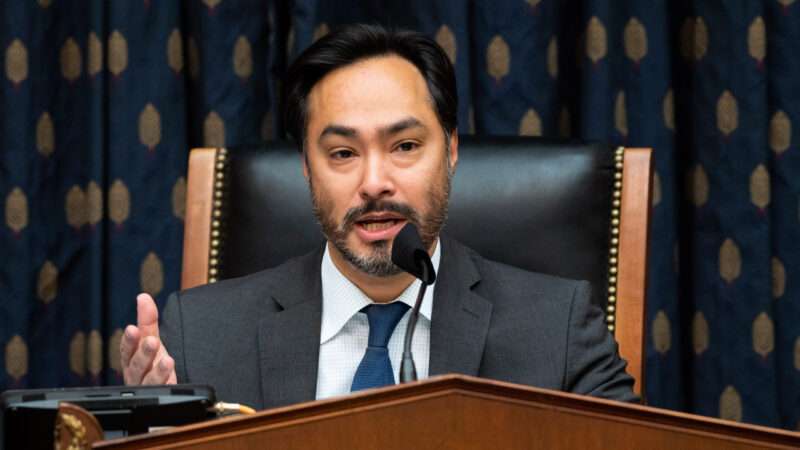
On Friday, Rep. Joaquin Castro (D–Texas) will introduce a resolution that rebukes a growing trend among Republicans to push for the U.S. to conduct military operations against Mexican cartels without the Mexican government's permission or proper authorization by the U.S. Congress. Such actions could "be considered an act of war and a violation of international law" and could "violate the constitutional separation of powers and implicate the War Powers Resolution," notes Castro's resolution.
"My resolution is both a statement of opposition to the use of force against Mexico and a statement that the White House cannot unilaterally use force," Castro tells Reason. "It's important to send a strong message that Congress would be opposed to any president making the unilateral decision to invade one of our allies."
Castro's resolution explains that the president has the "power to repel sudden attacks on United States persons and territory." It clarifies, however, that "the manufacture, transportation, and sale of fentanyl and related chemical compounds is not considered an armed invasion or sudden attack by a foreign adversary."
Therefore, it "should not serve as the basis for using military force without congressional authorization," the resolution continues.
Castro says that fentanyl overdoses are "a public health crisis and [need] to be treated like one." When asked which policies he supports to reduce fentanyl-related deaths, his answer stops short of some of the harm-reduction and drug-decriminalization policies prescribed by libertarians. Rather, he mentions increased federal funding for "treatment, recovery, and prevention services," and expanded collaboration "between the U.S. and Mexican law enforcement and public health agencies to prevent youth drug use." Castro also says he supports the Biden administration's National Drug Control Strategy, "which expands access to harm reduction and treatment programs while giving law enforcement more tools to intercept illegal drugs." He hopes the federal government will keep cracking down on pharmaceutical companies "that made billions from opioid addiction"—an approach that Reason's Jacob Sullum has criticized.
Castro's resolution comes amid heightened calls on the right to take a variety of heavy-handed and interventionist measures against Mexican drug cartels. Each candidate at the first two Republican presidential debates pushed for a more militarized border, with Florida Gov. Ron DeSantis going so far as to suggest sending U.S. Special Forces into Mexico.
Former President Donald Trump spoke about conducting missile strikes against cartel drug labs as early as 2020, The New York Times reported this week. Reps. Mike Waltz (R–Fla.) and Dan Crenshaw (R–Texas) helped bring the matter back into the legislative limelight in January when they introduced a joint resolution that would authorize the president to "use all necessary and appropriate force" against "foreign nations, foreign organizations, or foreign persons" involved in fentanyl production or trafficking. Congress has ceded so much of its constitutionally prescribed war-declaration authority to the president for eight decades now; it shouldn't cede more to combat cartels.
Even as Republicans express skepticism about the U.S. intervening in foreign affairs—criticizing the war in Afghanistan or the government's ongoing aid to Ukraine, for instance—they're increasingly calling for direct military action at the southern border and on Mexican soil. This approach shows disregard for the lessons of the war on drugs and the war on terror alike.
It also has the potential to severely complicate cross-border migration. David J. Bier, associate director of immigration studies at the Cato Institute, previously told Reason that he thought "the Mexican government would refuse any collaboration with the United States on immigration" if "the U.S. government conducted military strikes on Mexican soil." Castro takes a similar tone: "If the U.S. invaded Mexico," progress made by the Biden administration "to build partnerships with Mexico and other countries in Latin America to invest in regional resettlement and manage regional migration pressures…would immediately come to a halt."
"Military strikes against Mexico are the quickest way to destabilize Mexico and send millions of people fleeing across the border—including Americans who have an immediate right to return and Mexican citizens fleeing from the conflict," Castro tells Reason. "Anyone who is concerned about the current volume of migration should be vehemently opposed to war with Mexico."
The post Texas Rep. Joaquin Castro Warns Military Strikes Within Mexico Could 'Be Considered an Act of War' appeared first on Reason.com.







